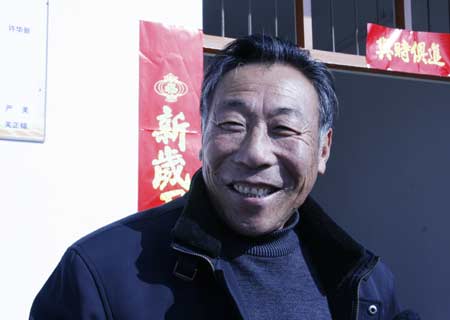 |
|
Guan Youjiang. (China.org.cn / WANG Ke)
|
Guan said: "Today, we are leasing our farmland back to the cooperative to explore a new route to prosperity."
The company will use the village's 13.3 hectares of farmland to grow commercial plants and flowers such as osmanthus and camphor trees.
Villagers who lease their farmland to the company are paid 500 yuan ($62.5) per 0.06 hectares of farmland, and are then free to look for a job elsewhere in China, or they can work for the company on a monthly salary of 600 yuan (about $75).
The agreement is effective for 10 years and the annual rent has to be paid before May 15, the start of the planting season. If the villagers don't receive their rent, they can claim their land back and start farming again.
The terms of the agreement and the level of rents can be re-negotiated every two years. Local villagers can then decide either to obtain dividends from the business by investing their farmland or continue leasing their farmland to the company.
"Land division and the contract system helped release the productive forces, but farming individually was never going to give the farmers a prosperous life," said Shen Hao, the Xiaogang Party chief.
He said: "leasing land to companies or individuals is our first step. But local people cannot only find a job with the flower company, they can also work for our own village-owned enterprises."
Two years ago, the village set up a small company to produce mushrooms. The village leaders invited three university students from the Anhui Science and Technology Institute to teach the farmers how to cultivate mushrooms. Since then, their products have been sold in the United States, the European Union and Japan.
Ma Zhanwen, the Party chief of Fengyang County, said 2007 per capita income in Xiaogang was 6000 yuan, 2000 yuan higher than the national average for rural areas.
Shen Hao told China.org.cn that the villagers had also embarked on a series of new measures to develop modern agriculture and tourism.
Shen said: "Every year, many villagers go to work in big cities like Beijing, Shanghai and Guangzhou. But since October, most migrant workers have been hit by the global financial crisis.
"Usually, they come home at the end of the year. But this year many of them have already returned. Some have said they won't go back next year," he said.
The problem of returning workers put the village committee under pressure to find additional jobs. After discussion with residents, the village committee outlined a plan to build a Xiaogang Industrial Zone.
Shen said: "The Xiaogang Flour Factory, Xiaogang Steel Framework Factory and Xiaogang Energy-saving Electronic Company are being built right now. Next spring, maybe most villagers won't need to leave to look for work. They will have jobs in the new factories."